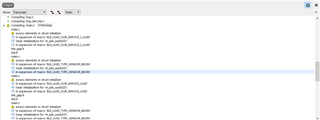Hello,
I am working on the ble_app_template example, nrf52840, SDK 17.0.2 and Segger Embedded Studio version 5.34. I have added multiple custom services to my code, however when I build and compile my program I get some warnings which I am not sure how to resolve.
Below is a screenshot of what those warnings are. I have also attached my code to where these warnings come from.

#define BLE_UUID_OUR_SERVICE_UUID 0x5763
#define BLE_UUID_OUR_SERVICE_2_UUID 0x8964
#define BLE_UUID_NUS_SERVICE 0x0001
static ble_uuid_t m_adv_uuids[] = /**< Universally unique service identifier. */
{
{BLE_UUID_NUS_SERVICE, NUS_SERVICE_UUID_TYPE, BLE_UUID_OUR_SERVICE_2_UUID, BLE_UUID_TYPE_VENDOR_BEGIN,BLE_UUID_OUR_SERVICE_UUID,BLE_UUID_TYPE_VENDOR_BEGIN}
};
Thanks
Ananye


